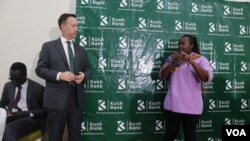Dozens of South Sudanese women attended a luncheon in Juba this week organized by Kush Bank to discuss financial inclusion for women entrepreneurs in the South Sudanese capital.
O'Grady says the bank is exploring ways to work with some South Sudanese women.
"We have a moral obligation to do this, helping people become banked, helping to break the barriers to financial inclusion is going to change things for the next generation," O'Grady said.
"As a part of our mission, it's our moral obligation to extend these services. So that is why when we see reports talking about only 6%, it's shockingly low. I think it is one of the lowest numbers on earth for financial inclusion. And that means we have to do more, we have to reach further," he added.
Chan Andrea, director for banking supervision at the Bank of South Sudan, told VOA's South Sudan in Focus last month that only 8% of South Sudan’s estimated 12 million people own a bank account.
Amer Manyok Deng, chairperson of the South Sudan Women's Bloc, says financial inclusion can help South Sudanese women boost their businesses.
"As to how we can import and export, because people are selling our fish and the women are in that business, they are buying fish from the river and they are selling it. But I will continue saying that majority of the women selling fish in the market are not South Sudanese, because South Sudanese do not have capital,'' Deng said.
O'Grady says the bank is planning to expand in South Sudan with vast business opportunities for banking in some remote parts of the country.
"We have to reach further and deeper into this communities. Next stop for us is Malut. We are going to the heart of oil county because there are workers that need to be paid there. There are communities that need to be served there, there is an agriculture revolution that is happening there and all this needs access to capital. And it needs to be done in a more efficient and secure manner," O'Grady said.
In May last year, the World Bank approved a $70 million grant to boost South Sudanese women's social and economic opportunities.







